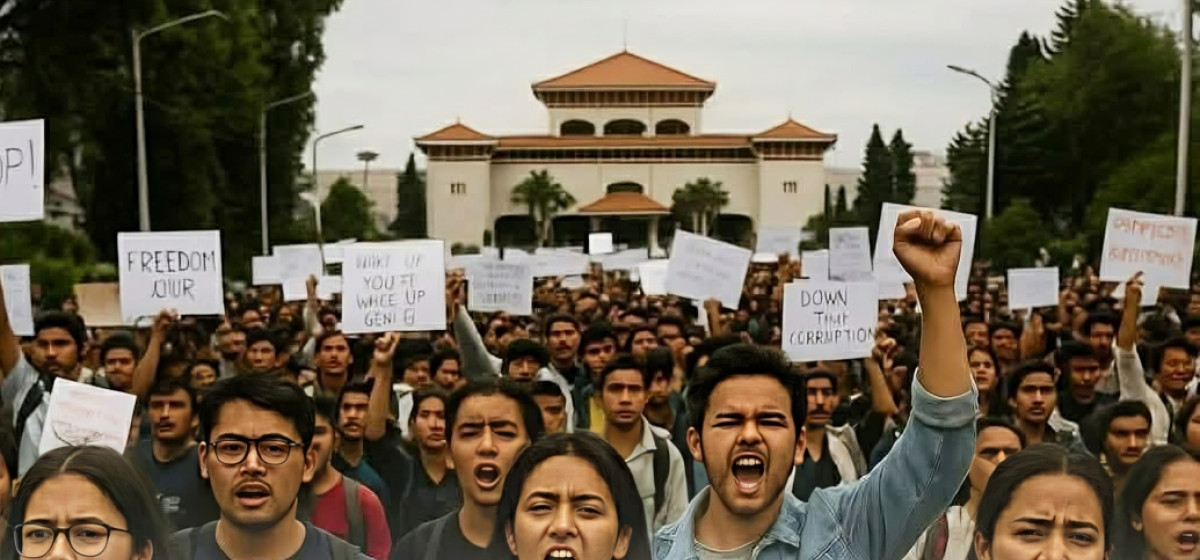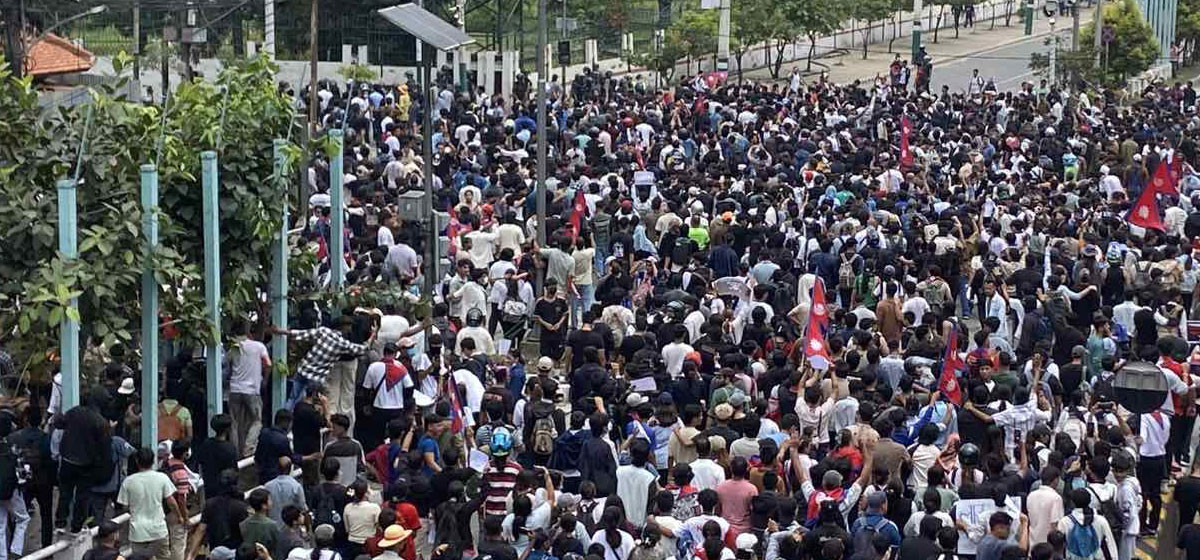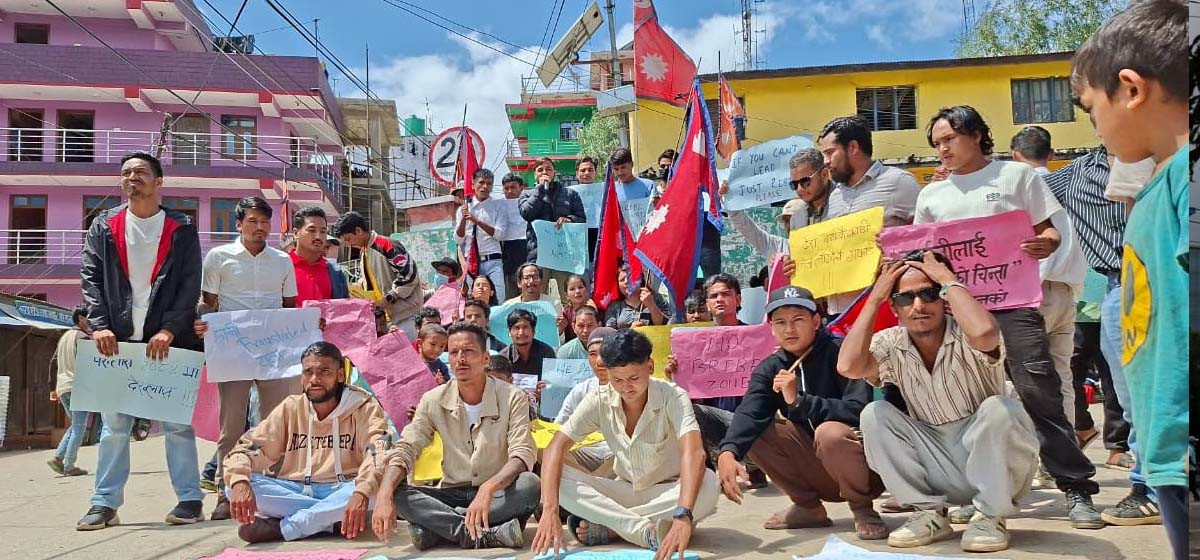KATHMANDU, Sept 8: When the platforms that connect a generation are suddenly silenced, how will the youth respond? For Nepal’s Gen Z, social media was more than just a platform, it was a lifeline for education, expression, and opportunity. Now, with those lifelines cut off, the youth are turning to the streets to make themselves heard.
Digital activism against privilege and corruption
Gen Z activists have declared through TikTok that they will launch a movement against the shutdown of platforms like Facebook, WhatsApp, and X. They are now preparing to take to the streets, gathering at Maitighar and in front of the federal parliament building, with protests planned on Monday (September 8) in Kathmandu, Pokhara, Biratnagar, and other cities across the country.
Public anger has surged since the government’s September 4 decision to simultaneously shut down 26 platforms, including Facebook, WhatsApp, Instagram and YouTube. In response, Gen Z has turned the issue into a broader campaign, raising voices against violations of fundamental rights as well as against nepotism and corruption.
One of the youths involved is Aarati Ray of Kathmandu. According to her, the country’s system has already been ruined by partisan politics, leaving no choice but for this generation to take to the streets. “We are clear. The country has been devastated by corruption. The root cause is a broken system,” Ray told Republica. For many, social media was the only outlet to vent frustration over hardships faced in public services.
Belgium hold off Brazil fightback to reach semi-finals

On TikTok, the hashtag #PoliticiansNepoBabyNepal is raising questions about expensive cars, foreign education, and lavish lifestyles of politicians’ children. As Gen Z’s movement heads to the streets, the sharpest criticism has targeted the family of Nepali Congress President Sher Bahadur Deuba. Gen Z activists have been posting photos and videos of his son Jaiveer and daughter-in-law Sivana’s lavish lifestyle, running a “Nepobaby” campaign online. Youth have also taken a dig at Shrinkhala Khatiwada, daughter of a former health minister Birodh Khatiwada; Ganga Dahal and Smita Dahal, daughter and granddaughter of former prime minister Pushpa Kamal Dahal; Anjila Basnet, daughter of former minister Mahesh Basnet; Ankit Khand, son of a former home minister, and Kshitiz Parajuli, son of former chief justice Gopal Parajuli.
Content creator Bishal Gautam made a satirical video calling out ‘Nepo Baby’ privileges, which has already gathered over 400,000 views. Another user @am___bika expressed frustration commenting: “Corruption in Nepal is not just a political issue — it's a deep-rooted crisis that affects every citizen, every community, and every dream for a better future. From the smallest public office to the highest levels of government, the misuse of power and public funds has become so common that many have stopped questioning it. That is the most dangerous part — when corruption becomes normalized, accepted, and even expected.”
The protest has been amplified by the viral “Holy Airball!” trend, which became a social media sensation among youth worldwide. The “Holy Airball” trend, popular among youth, uses a three-part format to show off personal or family achievements. The first slide shares a fact about themselves or their family, the second presents a common assumption, and the third humorously proves that assumption wrong with the phrase “holy airball.” Borrowing the basketball term for a complete miss, the trend became a way for young people to flex their success, wealth, or talents while playfully telling viewers not to underestimate them.
As the movement against the social media ban gained ground, the trend inadvertently became a platform for expressing frustration at government restrictions and corruption, turning it into a symbol of youth defiance. However, in the wake of the social media ban and growing public scrutiny, several of these flashy posts have reportedly been deleted by their original posters.
The shutdown of Facebook and YouTube has directly hit content creators and digital marketers. Despite promoting the idea of a “Digital Nepal,” the government shut down these platforms overnight without offering any alternatives for those whose income depends on them.
In response, youth have been voicing outrage at the government and political leaders. Many influencers, digital entrepreneurs and even some politicians have declared support for Gen Z’s protest campaign.
Gen Z’s protest campaign receives support
Former Communications Minister and UML leader Gokul Baskota has taken an aggressive stance against the decision. He said that once the Gen Z generation takes charge, no one can stop them. “Gen Z and Alpha generations have arrived, but here the Baby Boomer generation is trying to intimidate,” Baskota wrote on social media. “Not in a hurry, but if they come after watching carefully from horizon to horizon, no one can stop them.” He added, “Time is never stagnant, and change is inevitable. Seasons shift lightly in two months, so why complain about the creeping and seeping trends in politics? Every decade has gone through such bursts of change.”
Medical entrepreneur Durga Prasain has announced that he will personally participate in the Gen Z movement on September 8, while appealing to the government to avoid repression similar to the March 28 pro-royalist protest. Acknowledging that awareness among Nepali citizens has grown, Prasain expressed his support on social media: “Thanks to all Nepali brothers and sisters for joining this major campaign against corruption. I will personally take part in this movement to protect our country and citizens. I urge the government not to repeat the repression of March 28.”
Kathmandu Mayor Balen Shah acknowledged the Gen Z protest scheduled for September 8, describing it as a spontaneous movement by youth under 28, for whom he considers himself “still old.” He emphasized that no political party, leader, worker, MP, or activist should hijack the rally to serve their own interests. While he cannot attend due to age restrictions, Balen expressed full support for the protesters, stating the importance of understanding their wishes, objectives, and vision for the country. “Dear Gen Z, tell me what kind of country you want to see?” He wrote on social media, urging the government and society to listen to the voices of the younger generation.
While it is unclear who is organizing this movement, analysts describe it as a spontaneous youth protest. At the same time, some caution that singling out children for their parents’ actions by unknown groups is unfair and may lead to cyberbullying.
Political response
Amid the growing debate, Prime Minister KP Sharma Oli has criticized intellectuals, accusing some of creating confusion by claiming that the government is curbing freedom of speech. Speaking at the party’s general convention on Monday, Oli warned of the risk of exploiting the Gen Z generation, noting that young people expressing spontaneous anger against the government over the social media ban could be manipulated.
“For the sake of the country’s sovereignty and nationalism, the government has been insisting for a year that social media platforms must be registered in Nepal. Platforms operating outside the law have been blocked. Yet some intellectuals do not understand the meaning of freedom of speech,” he said.





































